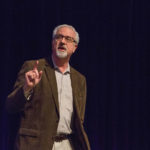Human history in general and the biblical narrative in particular are collections of immigrant stories, an Old Testament scholar told an online audience and an in-person group of Howard Payne University students and faculty.
M. Daniel Carroll (Rodas), a professor at Wheaton College and Graduate School, delivered the 14th annual Currie-Strickland Lectures in Christian Ethics at HPU on Feb. 4-5.
‘An immigrant book’
“The Bible is an immigrant book,” said Carroll, the son of a Guatemalan mother and immigrant Irish father. He challenged Christians to read Scripture from the perspective of immigrants’ experience.
The story of God’s people begins with Abram’s migration from his homeland to a land promised to him, Carroll noted. Along the way, “the father of the faith” told lies and risked his wife’s safety to cross borders, he observed.
In the book that bears her name, Ruth is referred to by others only as “the Moabitess,” he said. But the immigrant peasant woman becomes an ancestor of King David and, ultimately, Jesus.
The history of the Jewish exiles in Babylon essentially is the story of forced migration and deportation, he said. The prophet Daniel and his three friends were removed from their families, had their identities taken from them as they were given Babylonian names, and were compelled to learn the language and culture of an unfamiliar land. The four Hebrew young men resisted the majority culture the same way immigrants today assert their cultural identity—by taking a stand regarding food, Carroll noted.
The story of immigration is “as old as time,” and the reasons for migration generally remain the same—family, jobs, natural disaster and armed conflict, Carroll said.
The ancient Egyptians hated the Hebrews and feared them when their numbers grew, but Egypt needed Hebrew labor—a pattern seen repeatedly throughout human history and particularly evident in American history, he noted.
Welcoming rhetoric, unwelcoming reality
Carroll examined not only current challenges facing immigrants from Latin America, but also the forced migration of Africans and historic American prejudice toward Chinese laborers, Italian and Irish Catholics, and European Jews.
Sign up for our weekly edition and get all our headlines in your inbox on Thursdays
The tension in U.S. history—welcoming rhetoric and unwelcoming reality—is illustrated by the fact that assembly of the Statue of Liberty began the same year the Chinese Exclusion Act became law, he noted.
Progress with respect to immigrants in the United States and humane immigration policy has been—and continues to be—“slow, painful and messy,” he observed.
Rather than looking first at laws and public policy, Carroll suggested Christians launch any discussion of immigration from a different starting point.
“Begin by recognizing the immigrants’ humanity and its significance for engaging the topic and framing legislation,” Carroll said.
God loves the immigrant
One aspect that made the Torah unique among ancient law codes was its concern for foreigners, sojourners and outsiders, he noted.
The Law of Moses included gleaning provisions, sabbath rest commands and other protections for the vulnerable. Those laws were accompanied by reminders that the people of Israel should treat strangers with dignity and kindness because they, too, were strangers in an unfamiliar land. The rituals of Israel, such as observance of Passover, served as tangible reminders from the Hebrews’ history of deliverance from forced labor in a foreign land.
Beyond the personal experience of Israel, passages such as Deuteronomy 10:17-19 also appeal to concern for immigrants based on God’s character.
“Why love the immigrant? Because God does,” Carroll said.
In both the Old Testament and New Testament, migration is used as a metaphor for faith, he observed.
“We have a different king. We have a different citizenship. And we should live different kinds of lives,” he said.
“We are strangers, and this should be a very strange place to us. … The problem that happens for Christians is that this place is no longer strange. We kind of like it and want to keep the strangers out.”
















We seek to connect God’s story and God’s people around the world. To learn more about God’s story, click here.
Send comments and feedback to Eric Black, our editor. For comments to be published, please specify “letter to the editor.” Maximum length for publication is 300 words.